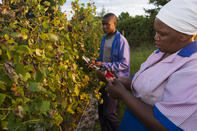A Cloudy Situation
Not all wines are created equal. Some are light and crisp, some are dark and full-bodied. Others are organic with conscious consumption in mind, and only some are vegan. Yes, you read correctly - not all wines are vegan. You might want to put aside your glass of vino as you read up on the trend that’s recently hit South African shores.

While you might have thought that all wines are vegan (because it’s grapes, duh!), it is certainly not. The wine-making process involves the filtration of the cloudy liquid through “fining agents” to make it clear and more palatable. The “fining agents” are usually animal products used as processing enzymes. Material like casein (a milk protein), gelatin (animal proteins) and chitosan (derived from the shells of crustaceans) are used to clarify, brighten and smoothen the wine, as well as enhance different flavours.
Many wine-lovers do not know that they are sipping on non-vegan deliciousness most of the time. This is because locally, wine producers are not legally obligated to list the ingredients of their wine. Convenient, right?
However, a fair amount of South African winemakers have started to opt for vegetarian and vegan-friendly “fining agents”, such as bentonite (a purified clay) and poly-vinyl-poly-pyrrolidone (a plastic substance). This allows for the purification of wine without the animal input, making it as vegan as the grape itself.
Local Industry

The need for transparency and conscious consumption has allowed the South African wine industry to pull up their responsibility socks and get to work on producing more eco-friendly, vegetarian and vegan-friendly wines. A demand for sustainably produced wine has risen in the last few years, changing the export market in particular - more people want more vegan, organic, eco-friendly wine to suit their lifestyle of mindful living.
Although you might not find that every wine label will read “Hey! We are vegan, buy us!” you’ll be able to locate a few vegan wines at your local retailer.